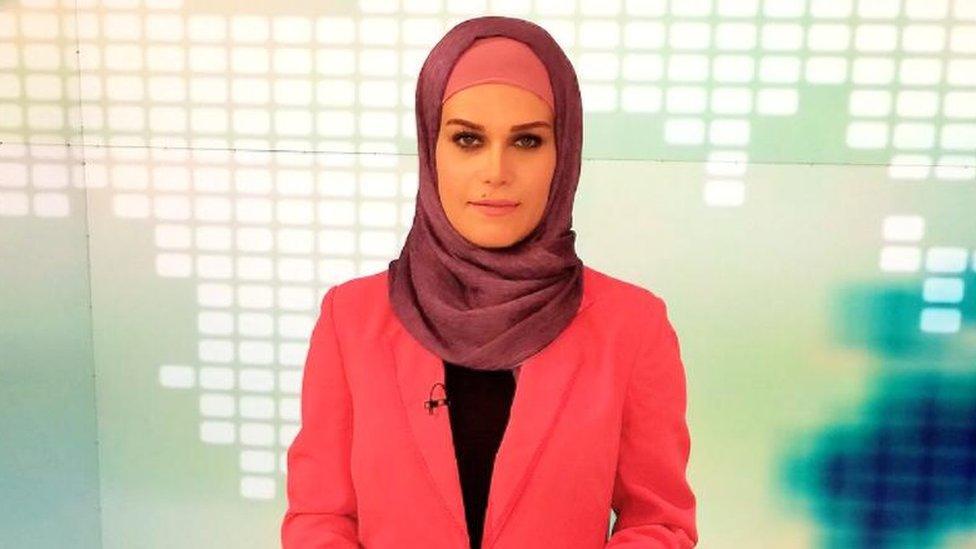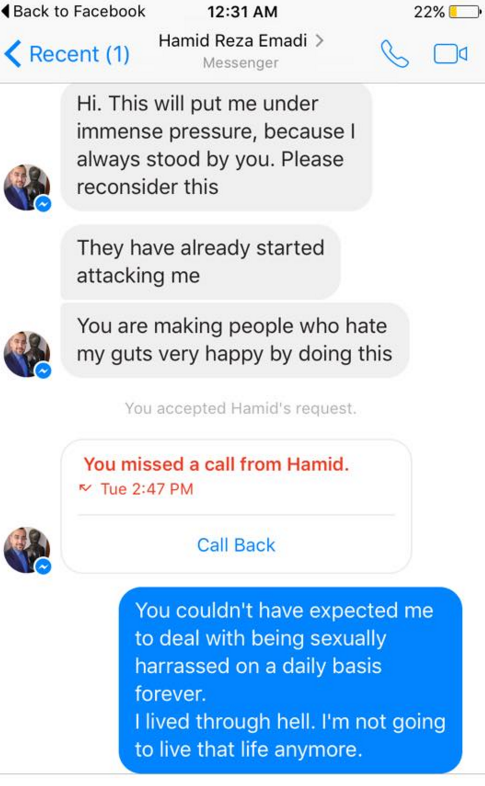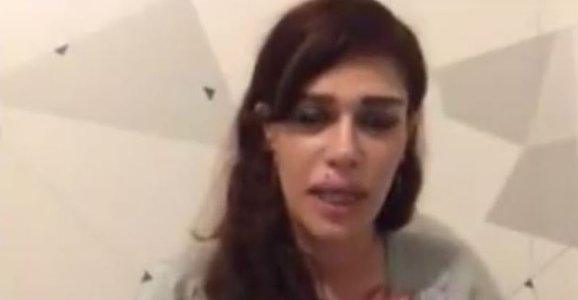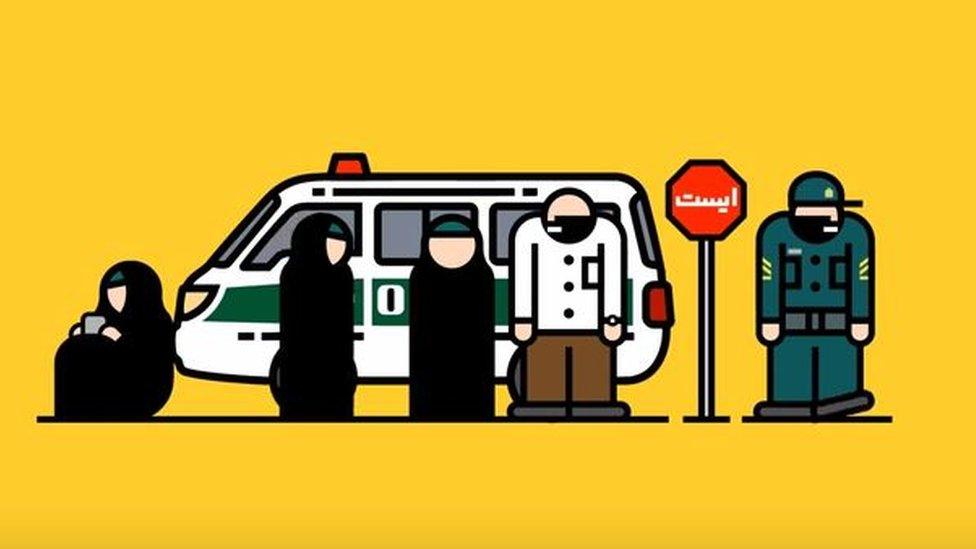Iranians speak out over sexual harassment scandal
- Published

Shirani said there was nobody she could seek help from.
Allegations of sexual harassment at an Iranian TV station are emboldening Iranian women to break their silence and share their experiences of a problem traditionally not acknowledged inside the country.
Sheena Shirani, a newsreader at Press TV, the state broadcaster's English language news channel, broke the taboo by speaking out about sexual harassment she says she endured from two of her managers over a prolonged period of time.
Her allegations went public in spectacular fashion when she posted online a recording of a phone conversation in which a man believed to be her boss, Hamid Reza Emadi, repeatedly asks her for sexual favours.
Following the incident Shirani quit her job and left the country and later published the audio file, which has been listened to more than 120,000 times on her Facebook page, external and an Iranian news site based outside the country. She also shared what appeared to be a screengrab from a text exchange in which Emadi asked her to take the audio down.

Another screengrab has also surfaced which apparently shows a WhatsApp message containing a statement from Emadi, denying the allegations and saying the audio was fabricated.
However, in an unprecedented step Press TV has announced that it has suspended two unnamed members of staff while allegations are investigated. One of them is widely thought to be Emadi and the other another member of staff whom Shirani has accused of sexually harassing her.
In a statement, external issued via Iran's government news agency, Press TV said: "Although the audio file is not legally admissible and no complaint has been made, but since the case is of a serious matter the relevant officials are investigating the case to clarify the issue."
The statement said that the audio file was made with the help of "people opposing the Iranian system with political motives" and it also said that the case is "suspicious" as Shirani - who it did not name - had not lodged a criminal complaint.
"As a natural reaction, it was expected that the person pursue the case before making it public on the social media networks," it added.
Shirani has responded that she had little choice as the superiors to whom she should have been able to complain were the people she had accused.
"In a society like Iran if you happen to be weak and if you do not maintain strong ties to powerful people..then you are basically on your own," she told, external the Persian service of the Voice of America. "In addition to that, if you are a woman and a single mother, you are completely devoid of any value in this society."
Shirani said the sexual harassment was part of a wider pattern of harassment she suffered at Press TV and was designed to undermine her. She complained she was constantly pulled up for a variety of petty offences including being a few minutes late for work and fined for not following the strict dress code required in governmental organisations.
"I knew no-one viewed me as a professional. I was viewed sexually", she told one interviewer.
Shirani's actions and her candid comments have prompted a debate about sexual harassment in the workplace, a topic that is rarely discussed in Iran and usually never mentioned on public platforms or the media.
Social media has provided a forum for Iranians to express their admiration for what Shirani has done.
"Her bravery deserves applause. All of us women need to learn from her and defend our rights as a human being," said one post on Facebook.

Shirani says she faced a variety of harassment
Another person posted: "Saluting your bravery and dignity…your voice has revived the voice of other victims".
Many women identified with Shirani and some shared their experiences. One wrote: "I believe her and understand her. I cried throughout the interview. There is no authority to go to and complain about those dirty looks, dirty words that hurt you, instead they punish you saying it is your fault to have become friendly, worn make-up, worn perfume or smiled."
Another woman tweeted that she had suffered constant harassment while working at an Iranian government ministry. "I listened to Sheena's audio file. Her story sounded so familiar," she said.
Yet another posted: "I am a woman and time and time again I have become uncomfortable with my male colleague's behaviour at my workplace. Let us be honest and stop thinking that the woman is always the problem."
Another Twitter user, external user shared a story about a colleague who committed suicide following constant harassment at her workplace.
The numbers of those sharing their disturbing experiences are not enormous. This is perhaps understandable, as the issue is directly linked to individual and family honour, a very well protected asset.

Follow BBC Trending on Facebook
Join the conversation on this and other stories here, external.

Some responses to Shirani's case have blamed the conservative nature of Iranian society for a lack of respect towards women. "This closed society and the pressure from religious bias has led to such cases", said one on Facebook. Another said: "Families need to raise kids, especially their sons, to have modesty. Our girls are not safe even in the streets let alone at the workplace."
In other incidents of sexual harassment in Iran, the victim, mainly women, are sometimes blamed for their "inappropriate behaviour" and have little legal protection from dismissal. Some of the social media reaction to Shirani's allegations have also laid the blame at her door.
"I think the recording of [the conversation] and its publication is just a womanly cunningness for personal gains", said one woman who posted on Facebook. She added that she believed Shirani must have given her manager hints which encouraged him to proposition her. Another said "These [women] are among the generation who want to get close to the power center and wealth through any means…but they will eventually become the victims".
But another Facebook comment responded: "It is shameful that many still consider the woman to be the culprit in such cases."
Shirani had worked at Press TV since 2007. She is divorced with one son. Emadi, who is married, was already a controversial figure. In 2013 he was placed on the European Union's human rights sanctions after the channel broadcast an interview with imprisoned Newsweek journalist Maziar Bahari, which was ruled to have been conducted under duress. The case later resulted in Press TV losing its licence to broadcast in the UK.
Next Story: Iranian youth get app to dodge morality police

Iranians are downloading a new app that allows them to share details of where religious morality police have set up checkpoints. READ MORE
You can follow BBC Trending on Twitter @BBCtrending, external, and find us on Facebook, external. All our stories are at bbc.com/trending.